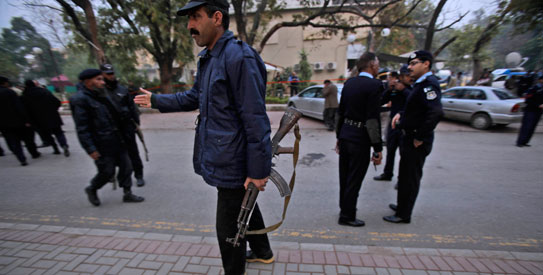
The assassination of the Punjab Governor Salman Taseer this afternoon in Islamabad by an armed guard reportedly deputed for his security raises the fundamental issue once again: that religious indoctrination is feeding the fires of hatred and intolerance. Although details as to the motive of the crime have yet to emerge, by the very trappings it seems little else but a crime of hate.
Mr Taseer had few friends left in his last days. His outspoken defence of the Christian woman, Aasia Bibi, who was accused of blasphemy under questionable charges leveled against her by fellow Muslim villagers and who has been on the death row in a Punjab prison for over a year awaiting appeal in a higher court, made him a hate figure for extremist and Islamist outfits and parties. Major religious parties called out nationwide strikes on Christmas Eve and New Year’s Eve to demand Aasia Bibi’s execution under the controversial blasphemy law, and to condemn her sympathisers, Mr Taseer being one of the foremost public figures amongst the latter group and thus the object of hate.
He, along with the PPP MNA Sherry Rehman, who has courageously sought to repeal or amend the blasphemy law, have been the only leaders to openly oppose the controversial law, like Benazir Bhutto before them had opposed extremism and Talibanisation and paid for it with her life, while a deafening silence prevails on the subject within the ranks of the PPP itself.
On the political front too Mr Taseer became a controversial figure in his home province the day President Zardari appointed him the governor in Punjab to watch over a provincial government led by his political arch rivals, the Sharif brothers. The sacking of Shahbaz Sharif’s government in 2009, the imposition of governor’s rule and then the restoration of Mr Sharif under court orders in March 2009 as the chief minister, added to the political bitterness that existed between Mr Taseer and the Sharifs. There was little love lost between the rivals till the time of Mr Taseer’s assassination, with no signs of any rapprochement on the anvil whatsoever.
Of late the Sharifs responded to Mr Taseer’s political opposition to their way of governance by resorting to means that were both unfair and untenable. Often volleys were fired at his personality, and his family’s lavish and somewhat indulgent—read ‘un-Islamic’— lifestyle. Only last month Mr Taseer was accused of having left the country without informing the Punjab government in breach of the state protocol; a sustained media campaign followed which despite its best efforts failed to prove that Mr Taseer had gone abroad. Earlier photographs of his family partying away in the privacy of their home were placed in the media. Mr Taseer had the courage and the old world grace not to be bogged down or issue a denial in the face of such ungainly criticism that was clearly below the belt.
The Islamists openly called for his dismissal from the office for supporting the case of the Christian convict, for seeking presidential pardon for her, if it should come to that, and for being a vociferous opponent of the so-called Islamic laws that were introduced by Gen Ziaul Haq and which at best have remained highly controversial. A few also threatened to try Mr Taseer for condoning blasphemy against Islam. But he in that ideological sense represented the somewhat traditional liberal stance of the PPP, which the party itself has not truly been very comfortable with of late.
It remains to be seen what actually motivated the killer to open fire on Mr Taseer, inflicting a fatal wound, but it is not far from informed conjecture to say at this point that the motivation could have most likely been religious intolerance which leads to extreme reactions. The trend is rampant nowadays, and has led to wholesale killing of citizens, attacks on Sufi shrines and places of worship of rival Muslim sects, and of the minorities.
This is partly because hypocrisy takes the best of many politicians from across the spectrum. Even non-religious parties like the MQM, the PML-N and the PML-Q, could be seen losing their composure when it comes to issues such as demanding the release of Dr Aafia Siddiqui from her American prison, citing little else in her defence besides her bona fides as a Muslim woman convict, but in reality wishing to add to the woes of their political rivals’ government. Similar is the stance taken on American drone attacks, even though everyone knows that Pakistan Army provides or shares the intelligence over which such aerial strikes are carried out against extremist elements.
Back to Mr Taseer’s assassination, it was rather uncanny to overhear a conversation that I did between two security guards outside the building they were deputed to guard, within minutes of the news of Mr Taseer’s death breaking. One guard congratulated the other on the assassination while the other responded by saying that the killer was indeed a very courageous man, God be praised.
This is not the country that makes one feel very safe.









































